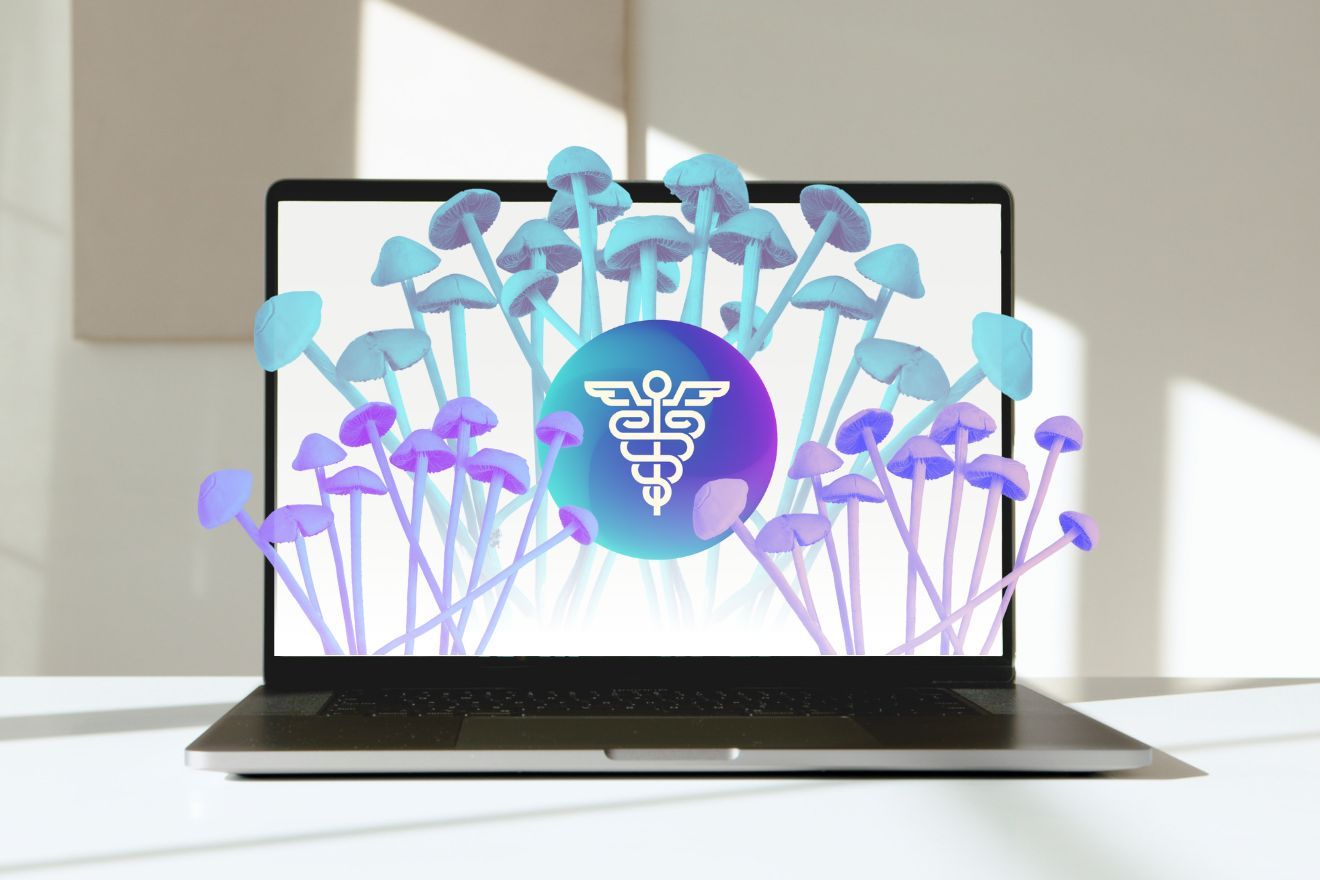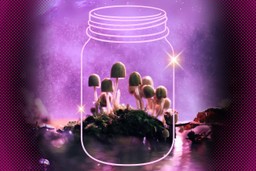Want to grow your knowledge about psilocybin with our top articles about psilocybin? Psilocybin is a psychedelic compound found in certain fungi, commonly referred to as “magic mushrooms.” When ingested, psilocybin converts to psilocin in the body, inducing hallucinogenic effects. It can alter perception, mood, consciousness, and thought patterns, often leading to feelings of euphoria.
The Psychedelic Support team has created dozens of resources about this particular plant medicine. Here is a tour of our best.
1. Where Does Psilocybin Come From?
If you don’t know already, psilocybin comes from fungi. However, there isn’t just one “magic mushroom”; in fact, there are over 200 mushrooms that create the chemical compounds psilocybin and psilocin.
This article helps answer some common questions about where psilocybin comes from:
- Why do these mushrooms make psilocybin and psilocin?
- How is psilocybin made?
- Where can I find psilocybin?
- How long has psilocybin been around?
- What are psilocybin’s cultural roots?
- What does the future of psilocybin look like?
Find out Where Psilocybin Comes From >>
2. The Wonderful and Diverse World of Psilocybin Mushroom Strains
It can be overwhelming to learn about over 180 mushrooms that contain psilocybin compounds. Furthermore, the amount of psilocybin varies depending on the strain, which can lead to differences in health outcomes and psychedelic journeys.
Psychedelic Support contributor Guy Borgford breaks down the most common strains of psilocybin mushroom strains that can be cultivated indoors and found in the wild, including the B+ strain, Penis Envy, and Mazatapec. The article provides a photo of each strain and describes their potency and effects.
Learn About Psilocybin Strains >>
3. Medicinal Mushrooms & Psilocybin: The Health Benefits
Are medicinal mushrooms the same as magic mushrooms, which contain the psychedelic compound psilocybin?
This article answers this question with a brief guide on common non-hallucinogenic medicinal mushrooms found in health food stores and the benefits of psychedelic psilocybin mushrooms. It discusses how psilocybin is considered a legitimate medicine and briefly reviews its potential for treating depression and anxiety.
Read About the Health Benefits of Psilocybin >>
4. How to Store Magic Mushrooms and Psilocybin Products
Following proper storage techniques for psilocybin mushrooms and products are important. These techniques can help keep you safe and maintain their potency, resulting in a more enjoyable experience.
This article provides helpful tips, including how to store psilocybin that comes in other delivery mechanisms. It discusses the shelf life of dried psilocybin mushrooms, microdose capsules, psilocybin extracts (liquid or powder), and fresh psilocybin mushrooms.
Understand How to Store Magic Mushrooms >>
5. Psilocybin for Women: Nurturing a Holistic Approach to Well-being
Conventional approaches often fail to meet women’s unique physical, emotional, and mental needs of women. Psychedelics are now a potential tool to help bridge this gap and enhance women’s health.
This article explores the latest research on the gender-based differences in psilocybin effects. It discusses how psilocybin has the potential to help women break free from societal expectations that negatively impact their self-esteem and body image and embrace their true selves. It describes the beneficial effects of psilocybin on hormonal fluctuations, mood disorders, and menstrual cycles, during pregnancy and breastfeeding/chestfeeding.
Step Into the World of Psilocybin for Women >>
6. Psilocybin Assisted Therapy Guide
If you’re looking for a long read, our psilocybin-assisted therapy guide gives you everything you need to know for healing. This guide discusses the following:
- Chemical structure of psilocybin
- Therapeutic timeline of clinical psilocybin research
- Detailed look into what is involved in psilocybin-assisted therapy
- Pharmacology of what psilocybin does to the brain
- Positive and negative effects of psilocybin
- Psilocybin contraindicated medications and conditions
- Psilocybin history, law and legal status globally
- Potential psychotherapeutic applications for psilocybin, such as anxiety, depression, obsessive-compulsive disorder, eating disorders, addictions, and headache disorders
- A sample of psilocybin-assisted therapy clinical trials with links
The article concludes with testimonials of psilocybin-assisted therapy from patients and therapists.
Get Stuck in on Everything About Psilocybin >>
7. Breaking Barriers in Clinical Trials: Bipolar Disorder in Psilocybin Therapy
Those with bipolar disorder are at risk of having their symptoms worsen if they take psilocybin. This article describes the latest research on psilocybin safety for the bipolar population. It shares the similar qualities that psilocybin has with typical antidepressants and why this is relevant for those with bipolar disorder.
The article explains why antidepressants work well for treating depression but not for treating bipolar depression. Lastly, it discusses why there is a need for a more sensitive model in psilocybin clinical trials.
Dive Into the Research on Psilocybin and Bipolar Disorder >>
8. Psilocybin and SSRIs: A Talk with Dr. Erica Zelfand, ND
Psilocybin and SSRIs work on serotonin receptors; therefore, the standard practice is to wean off SSRIs before beginning psychedelic therapy. However, is interrupting the medication therapy necessary?
This article summarizes Dr. Erica Zelfand’s one-hour talk (video included in the link) on whether both interventions could lead to better patient outcomes. Dr. Zelfand describes four case studies to support this question.
She compares how SSRIs and psilocybin work on the serotonin receptors and helps answer whether antidepressant medications are “just a crutch.” The article explains psilocybin-SSRI interactions and dives into the dangerous risks of serotonin syndrome.
Join Dr Zelfand on Psilocybin and SSRIs >>
9. Treating OCD With Psilocybin
OCD is a chronic mental health disorder where a person experiences persistent, uncontrollable, unwanted thoughts (obsessions). It’s a debilitating condition that can lead to severe impairment in daily functioning. This article shares the latest on the use of psilocybin as a potential therapy for OCD.
It discusses the safety, tolerability, and efficacy of psilocybin in those with OCD and shares the result of a case report of treating OCD with psilocybin. Given the limited research in this area, the article summarizes potential mechanisms that explain the effect of psilocybin on OCD symptoms and what the future may look like.
Understand How Psilocybin Can Help OCD >>
10. Psilocybin Therapy for Alcohol and Substance Use Disorders
This article delves into the latest research and clinical trials looking at psilocybin therapy as a treatment for alcohol and substance use disorders. It discusses why psilocybin therapy is often provided alongside Motivational Enhancement Therapy and cognitive behavioral therapy (CBT) and highlights specific studies that used this methodology and their results.
The article explains how psilocybin can help those with use disorders, including the effect the psychedelic has on the brain’s serotonin receptors and the default mode network (DMN), as well as the impact of a greater mystical experience. Lastly, it reviewed the disadvantages and side effects of psilocybin treatment.
Discover How Psilocybin Can Help >>
11. Phantom Pain and Psilocybin
There is growing interest in psilocybin as a treatment for phantom pain. This article discusses the causes of phantom limb pain and explains that although patients can avoid some triggers, others, like misinterpreted signals from the nervous system, cannot.
It reviews the current treatment options for this debilitating condition, including pain management drugs and non-medicated therapy such as acupuncture, biofeedback, and Mirror Therapy. The article provides current evidence of how psilocybin can help chronic phantom limb pain, including its effect on increasing neuroplasticity and stimulating serotonin receptors.
Explore Psilocybin’s Role in Phantom Pain >>
12. A Nurse’s Insight Into Psilocybin’s Effects on Her Body-Mind Functionality
Natalie Goldberg is a psychiatric and pediatric nurse who regularly performs functional assessments to determine her patients’ physical abilities for care and improvement.
In this article, she uses the same assessment process to describe how psilocybin’s effects have affected her own functioning. She describes observable personal changes in body functionality, including the following:
- Mental and sensory perception (hearing, visuals, and fatigue)
- Motor skills and mobility (coordination, balance, and spatial awareness)
- Cognitive functioning (memory, problem-solving, and decision-making)
Natalie shared:
“My hope is that this account — blending professional nursing insights with personal reflections — contributes to a balanced, informed dialogue about psilocybin. As research progresses and societal views evolve, it’s imperative that we continue to explore and understand psychedelics with both an open mind and a sense of responsibility, always prioritizing safety and preparedness in these profound yet promising mental experiences.”
13. Overcoming Trauma Bonds: A Psych-Nurse’s Self-Directed Psilocybin Breakthrough
In this article, Natalie explores her darker history with psilocybin therapy. She describes the profound changes she has experienced. In particular, dealing with anxiety, depression, various triggers, and managing trauma are central to her story. These deeply personal emotions may highlight the transformative potential for many others.
Exploring psilocybin’s impact firsthand, she went beyond clinical trials to analyze its influence on her struggles with PTSD, anxiety, and depression. Natalie explained:
“My experience may not mirror everyone’s. Even so, it offers a firsthand perspective outside the confines of clinical trials and is far removed from casual suggestions. I conducted these experiments in my childhood bedroom, as that is where life has currently brought me. Rooted in my professional experiences and interest in psychology and neurology, I may offer a unique glimpse into the potential of this widely cultivated plant in managing trauma.”
Read More of Natalie’s Story Here >>
14. Where Can I Get Legal Psilocybin in Oregon?
The Psychedelic Support team originally published this article on January 14, 2022, but they strive to stay current in their information and have regularly updated it since then.
It describes how Oregon became the first state to not only decriminalize the substance but to regulate and make it available for the public. The article provides information on how to sign up for legal psilocybin sessions in Oregon. It highlights important things to understand about Oregon Psilocybin Services, including licensed manufacturers, facilitators, insurers, funding, workplace, and housing protection.
Find out How to Access Psilocybin Therapy in Oregon >>
15. Five Things to Know Before Enrolling in a Psilocybin Clinical Trial
Suppose you are interested in joining a psilocybin clinical research trial. You need to read this article to understand what to expect and how to get involved. The article provides detailed answers to the common questions:
- How can I find psilocybin clinical trials?
- Am I eligible to participate in a trial?
- Who is sponsoring psilocybin clinical trials?
- What should I expect if I enroll as a participant?
- How will I benefit from joining a psychedelic clinical trial?
Learn How to Join a Psilocybin Trial >>
Follow your Curiosity
Sign up to receive our free psychedelic courses, 45 page eBook, and special offers delivered to your inbox.From psilocybin mushroom strains, their health benefits, and treatment of specific mental health conditions to participating in research, we hope you enjoyed your journey of learning and exploring.




















